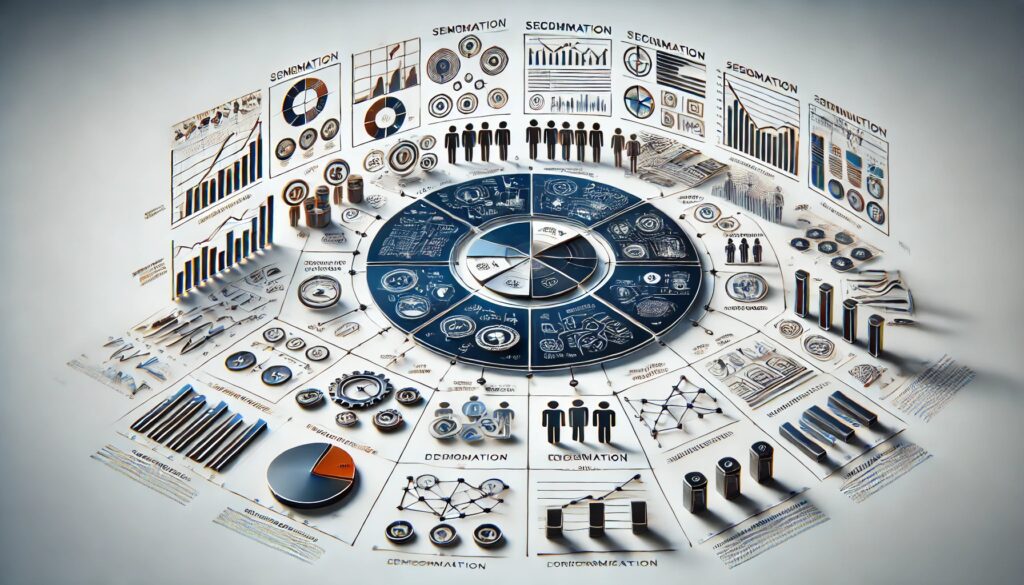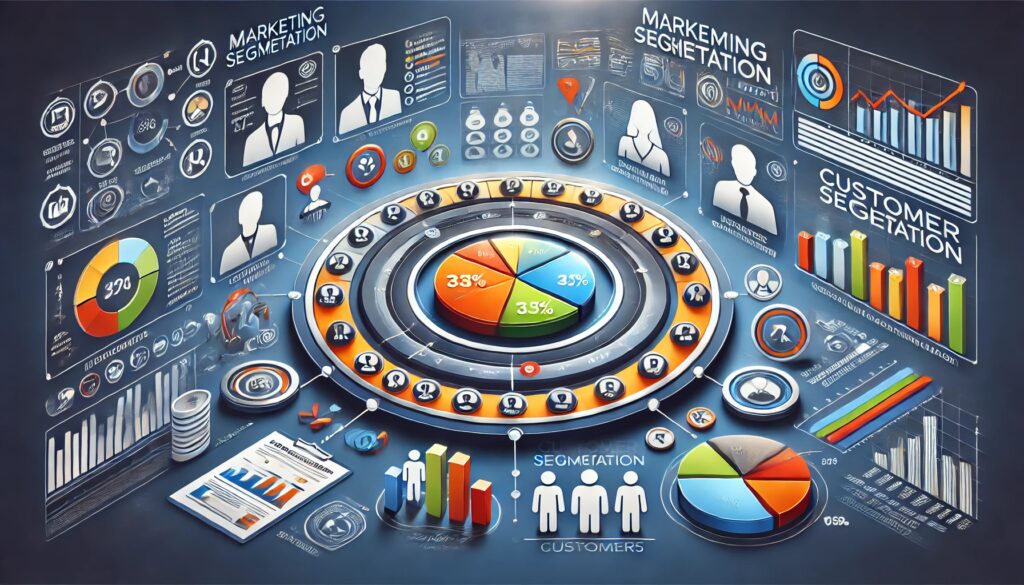
Enhancing Market Segmentation with AI: Precision in Targeted Marketing
Introduction: A Creative Dialogue
In the dynamic world of marketing, precision is everything. Traditional methods of market segmentation often fall short of capturing the nuanced preferences of today’s consumers. Enter Artificial Intelligence (AI), a game-changer that promises to revolutionize how businesses understand and target their markets.
The Evolution of Market Segmentation
Market segmentation has evolved from broad demographic groupings to more refined psychographic and behavioral insights. However, even with these advances, many companies struggle to tailor their marketing strategies effectively. This is where AI-driven segmentation steps in.
Here is a simple example of how AI can be used to enhance market segmentation. This example demonstrates how AI can be used to enhance market segmentation, leading to more precise and effective targeted marketing. By visualizing the segments, businesses can better understand their customer base and tailor their marketing strategies accordingly.



What is AI-Driven Market Segmentation?
AI-driven market segmentation uses sophisticated algorithms to analyze vast amounts of data. These algorithms can uncover patterns and correlations that human analysts might miss. By leveraging machine learning and predictive analytics, businesses can achieve a level of precision in targeted marketing that was previously unimaginable.
The Power of Big Data
The foundation of AI-driven segmentation lies in big data. Every interaction a consumer has with a brand generates data—purchases, website visits, social media activity, and more. AI can process and analyze this data at lightning speed, providing insights into consumer behavior and preferences.
Personalization at Scale
One of the most significant benefits of AI in market segmentation is its ability to deliver personalization at scale. Traditional methods might allow for broad categories, but AI enables marketers to create highly personalized experiences for each customer. This leads to increased customer satisfaction and loyalty.

Predictive Analytics
Predictive analytics is a cornerstone of AI-driven segmentation. By analyzing past behavior, AI can predict future actions. This means businesses can anticipate customer needs and tailor their marketing efforts accordingly. For instance, if a customer frequently buys athletic wear, AI can predict their future purchases and suggest related products.
Enhanced Customer Insights
AI doesn’t just segment markets; it also provides deep insights into customer motivations and preferences. By understanding why customers make certain choices, businesses can create more compelling marketing messages. This goes beyond demographics and taps into the emotional and psychological factors driving consumer behavior.
Real-Time Data Processing
In today’s fast-paced market, real-time data processing is crucial. AI can analyze data as it comes in, allowing businesses to adjust their strategies on the fly. This agility is essential for staying competitive and meeting the ever-changing demands of consumers.
Reducing Costs and Increasing Efficiency
Implementing AI in market segmentation can also reduce costs and increase efficiency. Automated data analysis eliminates the need for extensive manual labor, and AI’s accuracy reduces the likelihood of costly marketing mistakes. This allows businesses to allocate resources more effectively and maximize their return on investment.
Overcoming Challenges
While the benefits are clear, integrating AI into market segmentation is not without challenges. Data privacy concerns, the need for high-quality data, and the complexity of AI technologies can pose significant hurdles. However, with careful planning and execution, these challenges can be overcome.
Addressing Data Privacy Concerns
One major hurdle is data privacy. With the increasing amount of data being collected, consumers are more concerned than ever about how their information is used. Companies must ensure they are compliant with regulations like GDPR and CCPA. Transparency with consumers about data usage and robust security measures can help build trust and mitigate privacy concerns.
Ensuring High-Quality Data
For AI to be effective, the data used must be high quality. Incomplete or inaccurate data can lead to incorrect insights and poor decision-making. Companies need to invest in proper data management practices, ensuring that their data is clean, accurate, and up-to-date.
Navigating the Complexity of AI Technologies
AI technologies can be complex and require specialized knowledge to implement effectively. Companies may need to invest in training for their existing staff or hire new talent with the necessary expertise. Partnering with AI vendors or consultants can also provide the needed support and guidance.
The Role of Human Intelligence
It’s important to note that AI should complement, not replace, human intelligence. Marketers must use their expertise to interpret AI insights and make strategic decisions. The best results come from a collaborative approach that combines the strengths of both AI and human intelligence.
Case Studies: Success Stories
Several companies have successfully implemented AI-driven market segmentation. For example, Netflix uses AI to recommend content to its users, significantly improving user engagement. Similarly, Amazon’s AI-driven recommendations have been a key factor in its e-commerce success. These examples highlight the transformative potential of AI in marketing.
Netflix: A Case Study in Personalization
Netflix leverages AI to analyze viewing habits and preferences of its users. By doing so, it can suggest shows and movies that are tailored to individual tastes, resulting in a highly personalized user experience. This has not only increased user satisfaction but also boosted viewing time and subscription retention.
Amazon: Predictive Analytics in Action
Amazon’s AI algorithms analyze customer purchase history, browsing behavior, and even wish lists to predict what products a customer is likely to buy next. These predictions are used to recommend products, create targeted marketing campaigns, and even optimize inventory management. The result is a seamless shopping experience that feels uniquely personal to each user.
The Financial Sector: AI in Banking and Finance
AI-driven market segmentation isn’t limited to retail and entertainment. The financial sector has also seen significant benefits. Banks use AI to segment their customers based on spending habits, credit history, and other financial behaviors. This allows for more personalized financial advice, targeted loan offers, and customized savings plans.
Healthcare: Personalizing Patient Care
In healthcare, AI-driven segmentation can lead to more personalized patient care. By analyzing patient data, healthcare providers can segment patients based on their medical history, lifestyle choices, and genetic information. This enables more precise diagnoses, tailored treatment plans, and proactive health management.
Future Trends in AI-Driven Segmentation
Looking ahead, the future of AI-driven segmentation is promising. As AI technologies continue to advance, we can expect even more precise and insightful market segmentation. Innovations like natural language processing and enhanced predictive analytics will further enhance the capabilities of AI in marketing.
Natural Language Processing (NLP)
NLP allows AI to understand and interact with human language. This can be used to analyze customer reviews, social media posts, and other text data to gain deeper insights into customer sentiment and preferences. By understanding the language of their customers, businesses can tailor their marketing messages even more effectively.
Enhanced Predictive Analytics
As AI models become more sophisticated, their predictive capabilities will improve. Enhanced predictive analytics will allow businesses to anticipate customer needs with even greater accuracy, enabling them to stay ahead of market trends and respond proactively to changes in consumer behavior.
AI and Augmented Reality (AR)
The integration of AI with augmented reality (AR) is another exciting trend. AR can create immersive shopping experiences, and AI can personalize these experiences in real-time. For example, an AI-driven AR app could recommend products based on a user’s preferences and previous purchases, providing a unique and engaging shopping experience.
Conclusion: Improve Market Segmentation with AI
The integration of AI into market segmentation marks a significant step forward for businesses. By embracing AI, companies can achieve unparalleled precision in targeted marketing, leading to better customer experiences and increased profitability. The future of market segmentation is here, and it’s powered by AI.
References and Further Reading
For more information on AI-driven market segmentation and its benefits, check out these resources:
- How AI is Changing Market Segmentation
- The Role of Predictive Analytics in Marketing
- Case Studies: AI Success in Marketing
- AI-Powered Precision Marketing
- Interpretability and Explainability in Machine Learning
- GraphCast
- RTNet